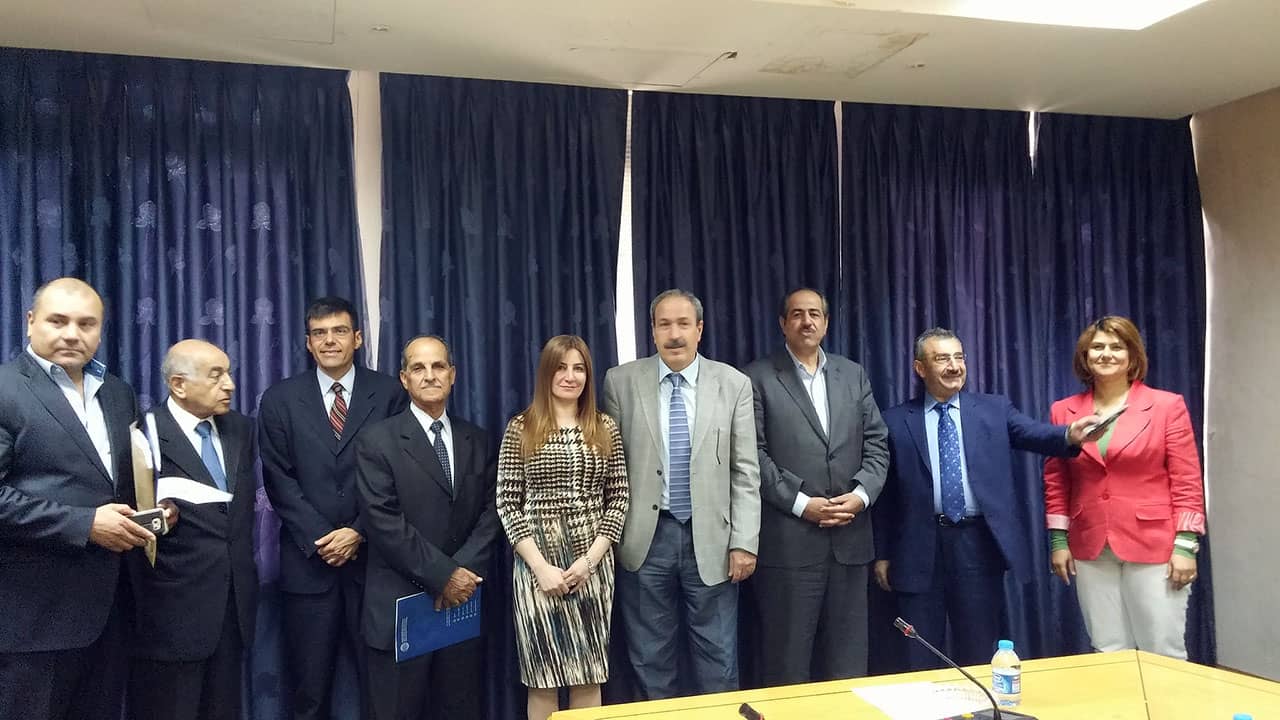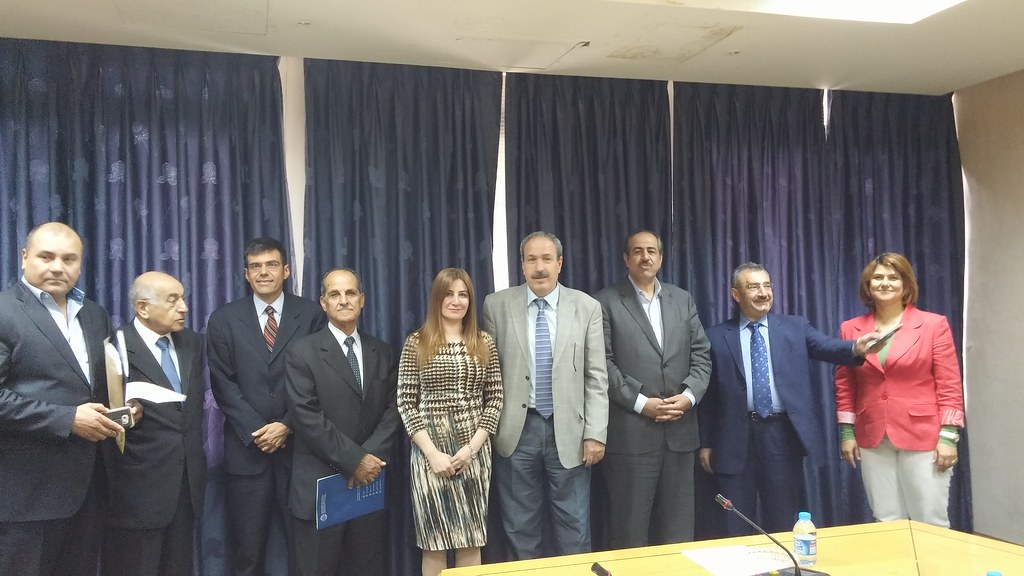
July 27, 2015 | Amman, Jordan
In Northern Lebanon, Syria, Iraq and several other countries in Middle East and North African (MENA) Region, the civilian population is constantly under attack, minorities and dissenters are targeted for elimination and a culture of impunity and lawlessness provide fertile ground for the repetition of mass-atrocities and the continuation or escalation of armed conflict.
Putting an end to the cycle of violence and impunity is a conditio sine qua non for a credible and sustainable stabilization process, the acceptance of peace-agreements by victims and affected community, and the halt to an endless spiral of injustice, recrimination, revenge, retaliation and reprisal.
While most Governments in the MENA Region have expressed support for the International Criminal Court (ICC), few have taken the necessary steps to ratify or accede to its founding treaty, the Rome Statute. As of today, 123 State are parties to the Rome Statute, but in the MENA region, only Jordan in 2002, Tunisia in 2011 and Palestine in 2015 have decided to join the system of the ICC.
In light of the dramatic situation in the region since the uprising in Syria in 2011 and the spill-over of conflict into Iraq and Lebanon since June 2014, where there are evidence of crimes against humanity, war crimes and even genocide, as well as aggression being committed, putting an end to impunity and breaking the cycle of violence and death are absolute imperatives. Jordan has also been affected by the crimes committed by Da’esh/ISIS while suffering from an enormous refugee flow, which is applying further pressure on the Authorities and the population.
Those threats to the stability of the region highlight the work of the global network of PGA to mobilise the International Community to stop the mass-atrocities committed in the region and world-wide. Since 2006, PGA has shared information and created awareness on the Rome Statute system among politicians from the region, who have participated in a number of events of the Campaign for the Rome Statute of the ICC, including the Amman session of the PGA Working Group on Universality of the Rome Statute in the MENA Region in October 2014 and the 8th Consultative Assembly of Parliamentarians for the ICC & the Rule of Law held in Rabat, Morocco, in December 2014.
PGA thus organised on 27 July, in the Parliament of Jordan, a follow-up Strategy meeting of those two events with Parliamentarians from Jordan and Iraq to discuss on Accountability for Mass-Atrocities and Strategies to Counter Violent Extremism and Protect Civilians in the MENA region, with the view of advancing the campaign towards Iraq’s ratification and Jordan’s domestic implementation of the Rome Statute.
The Strategy Meeting was introduced by Hon. Hazem Qashou, MP, Chair of the Foreign Affairs Committee of the House of Representatives of Jordan, who expressed deep concern for the security situation of Jordan, which currently has 2 million refugees on its territory, and the region in general. He called on the International Community to take action and invited his fellow Parliamentarians to discuss and adopt a series of concrete action-points during this meeting to address the challenges faced by the region and to find comprehensive solutions to it, ensuring the respect of their common values, civilization and heritage.
During the meeting, Parliamentarians from Iraq and Jordan condemned strongly the atrocities that have been committed in the region and called for more determined action by the International Community as a whole and national authorities to enhance the protection of civilians. They recognised that within the framework of a comprehensive response to this threat, ending impunity for atrocities and ensuring accountability of their perpetrators should be a priority through the ratification of the Rome Statute. They praised Palestine for having recently ratified the Rome Statute as a preventative tool to impede future commission of serious international crimes, and called on Iraq to do the same in light of the crimes committed by ISIS in particular.
Hon. Vian Dakhil, MP (Iraq), PGA Member, reminded that 400.000 Yazidis are currently internally displaced and that 2000 girls and children have been forcibly abducted and enslaved by ISIS, the majority of whom are still under its control. She has been working relentlessly to ensure that the basic needs of those refugees are met, while trying to save as many girls and families from ISIS’ savagery, sometimes having to pay in exchange for their freedom. With some of her sisters and brothers, all doctors, have created a Center, providing reconstructive surgery for some of the escapees. However she warned that more needs to be done to support and rehabilitate those victims, psychologically and medically. She thus called on the International Community to support further the Yazidi community and recognise the genocide committed by ISIS against this population, asking for an intervention to stop the atrocities and to ensure accountability for the perpetrators. In this regard, she recognised the necessity for Iraq to ratify the Rome Statute in order to address the impunity gap and urged the creation of reparations’ programmes for victims of mass-atrocity crimes.
PGA Member Hon. Faig El Sheakh Ali, MP reminded that in early 2005 the Government of Iraq had taken the necessary steps to ratify the Rome Statute but then went back on its decision. He encouraged all relevant stakeholders to put pressure on the government of Iraq to ratify the Rome Statute to ensure the universality of its system in order to end impunity for all parties to the conflict while recognising its preventative role as guarantee for non-repetition of crimes. He recalled the recent killing by ISIS of 1700 young solders at Camp Speicher and condemned the silence surrounding the massacre as well as the lack of action by Iraqi authorities, including army officials, to stop the crimes and ensure accountability for them.
Parliamentarians agreed with the PGA position that seeking to merely destroy or eliminate ISIS and/or other perpetrators of inhumane acts labelled as “terrorists” through targeted-killings and executions would continue to deny victims from access to justice and truth, and would continue to be used by extremists’ propaganda to generate emulation of ‘martyrdom’ and reinforce the recruitment of foreign and domestic fighters. Parliamentarians expressed their concern about the seriousness and effectiveness of this strategy and rather called on comprehensive and multifaceted approaches to counter violent-extremism to address the root causes of the problem, focusing on putting an end to the expansion of the number of fighters and ensuring that they face justice for the crimes they have committed, at the national and international level, through the ratification of the Rome Statute allowing for the effective intervention of the ICC when and if necessary (i.e. in the case of the attempted genocide against the Yazidis and other minorities or in the case of the crimes against humanity and war crimes directed against the civilian populations of Syria and Iraq).
Following the intervention of Hon. Jamil Nimri, MP, PGA leading Member in Jordan and facilitator of the meeting, the participants recognised their role as Lawmakers to ensure further support and commitment to the ICC by their Governments and constituencies as a way to contribute to a Rules-Based International Order rather than a world-order based on the rule of force. Hon. Abdil Al-Odat, MP (Jordan), Chair of the Legal Committee of the House of Representatives also underlined the need to ensure effective operation of the principle of complementarity by implementing the Rome Statute so as to complement the efforts of the ICC and ensure accountability at the national level, States having the primary responsibility to investigate and prosecute those crimes.
Hon. Dr. Rula Alhroob, MP (Jordan), Chair of the Human Rights Committee of the House of Representatives, highlighted the necessity to also focus on education as children affected by armed conflicts are lacking any access to basic rights, including education, and might thus end up repeating the same cycles of violence. As she encouraged efforts to document the atrocities that are being committed in the region when they occur, so as to avoid any loss of evidence, the participants recognised the role of Non-Governmental Organisations documenting atrocities in the regions, as well as of UN-entities such as the UN High Commissioner for Human Rights and the Independent International Commission on Syria.
Following those fruitful discussions, the participants agreed on the following actions-points to undertake
I. Explain the issues and educate Parliamentarians, Governmental Authorities and the public at large concerning:
- the different levels of responsibility for the crimes being perpetrated in the region and the failure to address impunity;
- the different actors involved;
- the different nature of the crimes that are being committed, so that not all situations of armed-conflict and alleged perpetrators are confused in the same basket;
- the different issues and challenges at stake, which may not be simplistically addressed through the rethorics of fighting terrorism.
II. Intervene through the following strategies:
- Encourage and promote a stronger and more effective intervention on the ground of the International Community, in particular via the current International Coalition against Da’esh/ISIS, to ensure and enhance the protection of civilians under International Law;
- Establish the jurisdiction of the ICC and of competent National Courts over mass atrocity-crimes (genocide, crimes against humanity and war crimes) in Syria and Iraq, primarily via the ratification of the territorial States and of the States of nationality of the alleged perpetrators, bearing in mind that Jordan, Palestine, Tunisia and almost all European countries have already ratified the treaty.
III. Change through the following strategies:
- Calling for the ratification of the Rome Statute of the ICC specifically by Iraq, as well as for its universality, which has not yet been attained;
- Reinforcing and reforming the International Coalition against Violent Extremism so that the policy of targeted-killings is discontinued and replaced by a policy to bring to justice, wherever possible and feasible, alleged perpetrators of atrocity-crimes, which includes attacks on civilian targets committed by terrorist groups.
- Planning in a careful and detailed manner for the future by ensuring that even during the armed conflict significant measures to deal with post-conflict are put in place, including accountability, reparations and rehabilitation mechanisms, as well as guarantees of non-repetition of mass-atrocities, hence to ensure that pro-active steps are taken to promote durable peace with justice and that lessons are genuinely learned from the shortfalls of the International Community intervention and failure in the situation of Libya.
Finally, to follow-up on these important issues and the actions points adopted during the meeting, all the participants agreed on the necessity to hold soon a Parliamentary Event on the Rule of law, Accountability and the ICC gathering parliamentarians from the region, in particular Iraq.
PGA remains committed to cooperate with partners, such as the United Nations and the European Union and their Member States, to ensure that its global and regional parliamentary constituency for the Rule of Law, International Peace and Security will be able to develop its potential and serve the best interests and the fundamental human rights of the peoples that it represents.




